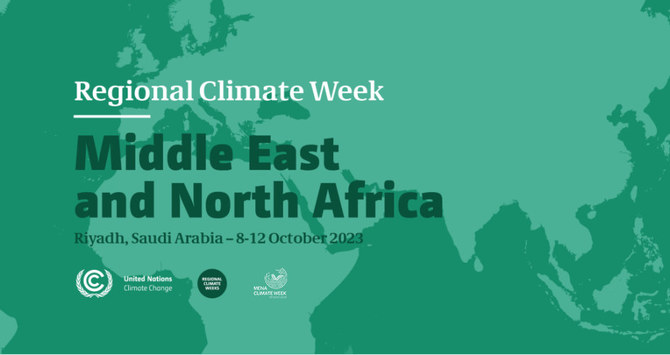Why hosting MENA Climate Week in Riyadh makes sense

https://arab.news/mq5gk
Saudi Arabia will host MENA Climate Week 2023 in Riyadh on Oct. 8-12. It is one of four regional climate weeks that serve as precursors to the UN COP28 scheduled from Nov. 30 to Dec.12. in Dubai
The climate weeks aim to build momentum toward the big COP meeting and push toward fulfilling the Paris commitment to hold “the increase in the global average temperature to well below 2 degrees Celsius above preindustrial level” and make efforts “to limit the temperature increase to1.5 degrees Celsius above preindustrial levels.”
This is no small goal and cannot be achieved unless all countries make their economic activities consistent with this objective. The other regional climate weeks are held in Kenya, Panama, and Malaysia.
Significantly, the UN COP28 is the second climate change conference taking place in the MENA region and the first one hosted by a country which is also a major oil producer.
The MENA region is affected by climate change with major droughts and other weather events resulting in floods and devastation. At the same time, the region is home to some of the largest producers of hydrocarbons. This apparent dilemma highlights the fact that the Paris goals cannot be achieved if energy producers and consumers are not committed in equal measure, and that is why hosting Climate Week in Riyadh and COP in a center of hydrocarbon production are significant events.
However, we need to be realistic in our approach as the global population is projected to increase by 2 billion persons in the next 30 years with many countries in the developing world struggling to alleviate poverty levels — especially lifting more than 700 million people out of energy poverty.
This means that pragmatism in reconciling climate actions with the needs of economic growth and energy security is quintessential. It also means that energy consumers and producers alike need to look at reducing the carbon footprint for the energy they consume or produce — be they hydrocarbons or electricity.
An open mindset toward carbon removal technologies such as carbon capture utilization and storage are prerequisites to achieving the Paris goals.
Under the Saudi Green Initiative, the Kingdom has become one of the largest investors in green energy globally and has also undertaken to plant 10 billion trees
Cornelia Meyer
In this context, the climate weeks are a big deal, which is reflected by the fact that the global partners include the UN Development Programme, the UN Environment Programme, and the World Bank Group. The regional partners for MENA Climate Week are the Islamic Development Bank, the International Renewable Energy Agency, the UN Economic and Social Commission for West Asia, and the League of Arab States.
Here is where MENA Climate Week being held in Riyadh is more than meets the eye. The four tracks tie in nicely with the Saudi and MENA green initiatives, which set out long-term action plans to reduce emissions and increase the use of clean energy, as well as with Vision 2030.
They are energy systems and industry; cities, urban and rural developments, infrastructure and transport; land, ocean food, and water; and societies, health, livelihoods, and economies.
Under the Saudi Green Initiative, the Kingdom has become one of the largest investors in green energy globally and has also undertaken to plant 10 billion trees.
Saudi Aramco boasts of the lowest emissions for producing oil and gas in the world and the company alongside Saudi research institutions is a leader in research, development, and the deployment of carbon removal technologies such as CCUS.
Oil and gas will be required for some time to come to ensure prosperity, especially in the developing world, which makes low carbon intensity production and CO2 removal technologies pivotal, for the enemy is not carbon, it is CO2.
So much for energy. Vision 2030 envisions major infrastructure projects pertaining to transport, clean living, and beyond. All of the above is not just about Aramco, NEOM with the Line and the Oxagon floating industrial district or Qiddyia and Diriyah, or indeed the Red Sea and other tourism projects; it is about the mindset of a country, its leaders and its population when it comes to conserving nature and producing energy responsibly.
In that sense, it is encouraging to see Riyadh hosting Climate Week. It ties in with so many of the Kingdom’s initiatives and it allows the country and the region to showcase their vision toward achieving the Paris climate goals, while not neglecting economic prosperity — especially in the developing world.
• Cornelia Meyer is a Ph.D.level macroeconomist, energy expert and CEO of Meyer Resources, a business consultancy.









































